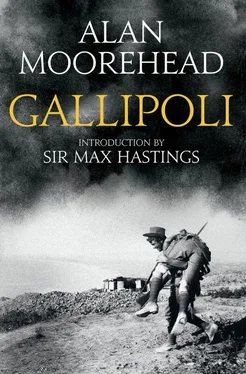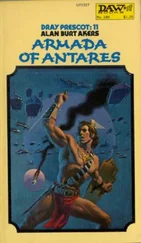Liman lost no time in taking up his new command. Having asked for and got the reinforcement of an extra division, he set off on March 25 for the peninsula — the very day on which Hamilton was sailing away from it to regroup his forces in Egypt. Liman’s departure indeed was so rapid that in many ways it resembled Hamilton’s hurried exit from London twelve days earlier; he waited neither for his staff nor his reinforcements, but took the first available boat and landed in Gallipoli town on the morning of March 26. There he set up his headquarters in the bare rooms of the French consular agent’s house and got to work.
The defence of the Gallipoli peninsula and the Dardanelles does not present any great mystery, at all events in its broader aspects. The peninsula juts out into the Ægean Sea for a distance of fifty-two miles, and it has a misshapen lozenge formation — very narrow at the neck, widening out to twelve miles in the centre, and then tapering off again to the tip at Cape Helles. The hills and the beaches are the important features, since an invading army presumably would first want to land, and then as quickly as possible get on to the heights whence it could dominate the Dardanelles. There were four beaches: at Bulair at the neck, at Suvla Bay half way down the peninsula, at Ari Burnu, still further south, and at the tip at Cape Helles. Behind all these landing places there was high ground — it almost formed a spine running down the centre of the peninsula — but the really important eminences were the Tekke Tepe ridge which made a semi-circle around Suvla Bay, the Sari Bair chain which rose to 1,000 feet just to the north of Ari Burnu, and Achi Baba, a rounded, gently-sloping hill 709 feet high, which was about six miles north of the Cape Helles beaches and dominated them entirely.
Similar beaches and hills existed on the eastern side of the peninsula along the Dardanelles, but it was hardly likely that an enemy would attempt a landing there, since he would come under fire from the Turkish guns in Asia, and so from Liman’s point of view they could be disregarded.
There remained the Asiatic side — the danger that the enemy might come ashore somewhere opposite the islands of Tenedos and Mytilene and make his way north across the plains of Troy towards the Narrows.
It was then, a question of guessing just where the invader was going to strike: at Bulair, where he could cut off the peninsula at the neck, at Suvla and Ari Burnu, half way down, where he could rapidly cross over to the Narrows, at Cape Helles, where his naval guns could dominate the land on three sides, or in Asia, where he had space to manœuvre: or at two or three or all these places?
Liman found that he had six divisions known as the Fifth Army under his command, and at the time of his arrival they were scattered along the coastline in a way which he considered bizarre if not downright dangerous. ‘The enemy on landing,’ he observed, ‘would have found resistance everywhere, but there were no reserves to check a strong and energetic advance. I ordered the divisions to hold their troops together and send only the most indispensable security detachments to the coast.’
It seemed to the new commander that the point of most danger was the Asiatic shore, and he accordingly posted two divisions there to the south and west of Troy — the 11th, and later, the 3rd, which he had trained himself and which was now on its way from Constantinople. Next in priority he placed Bulair, and here two more divisions, the 5th and the 7th, were disposed. A fifth division, the 9th, was sent to Cape Helles. To the sixth and last division, which was now under the command of Mustafa Kemal, there was assigned a special role: it was to remain grouped near Maidos on the Narrows, directly under the commander-in-chief’s orders, and would stand ready to go north to Bulair, south to Cape Helles, or across the straits to Asia, according to where the danger most threatened. Liman knew all about Kemal’s anti-German views, but he regarded him as an efficient and intelligent soldier; and there may even have been some grudging respect for the new commander-in-chief from Kemal’s side. At all events, this mobile assignment suited Kemal admirably.
Liman’s headquarters staff in Gallipoli town was Turkish, but he had, scattered through his divisions, a number of German officers in senior commands; and the German gunners and other technicians remained at the Narrows under a German admiral.
Having placed his forces where he wanted them — and these dispositions have been applauded by almost all experts who have studied them — Liman next got his men into training. They had grown stiff, he says, in their garrisons, and he now instituted a programme of drilling and digging. By day the men marched. By night they came down to the coast and worked on new roads and entrenchments. There was a shortage of every kind of material, and much improvisation was required. Spades and other implements were taken from the peasants, and the soldiers even dug the earth with their bayonets. When the supply of barbed wire gave out they ripped up the fences of the farms; and on the most likely landing places this wire was spread beneath the surface of the water. Land mines were constructed out of torpedo heads.
This work was pressed on with great haste, for there were many signs that the Allied attack would not be much longer delayed. Before the end of March Liman learned that four British officers had arrived in Piræus in Greece, and had there bought for cash forty-two large lighters and five tugs. The British apparently were not very successful in keeping watch on spies in Lemnos and the other Greek islands, for a stream of information about the Allies’ preparations kept reaching Constantinople by way of Egypt and Greece. General Hamilton’s arrival had been reported. It was known that a landing pier had been built in the harbour of Mudros, on Lemnos, and that stores and equipment were being unloaded there. Most of these reports came from the Balkans, but even as far off as Rome German agents were hearing rumours of the coming offensive, and these were duly relayed to the headquarters in Gallipoli. At one time it was said that 50,000 British soldiers had assembled on Imbros and Lemnos. Then the total was increased to 80,000 with 50,000 French in addition. Though confusing, all this intelligence pointed in the same direction: there was not much time left.
Each day, too, there was a good deal of enemy activity which Liman could see with his own eyes. Allied aircraft of a newer, faster pattern had begun to fly over the peninsula on reconnaissance. Like cruising sharks, grey, silent and sinister, the silhouettes of British warships kept ceaselessly moving back and forth far out to sea.
Then in the third week of April there occurred a sudden flurry of activity in the straits themselves.
Shortly after dawn on April 17 Turkish sentries at Kephez Point saw a submarine come to the surface. Apparently it was heading for the Narrows with the intention of passing through to the Sea of Marmara, but suddenly it was caught in a violent eddy and began to drift towards the shore. At once every Turkish gun in the neighbourhood was turned on to the helpless vessel, and as it touched the shore the crew came on deck and were swept into the sea by machine-gun fire. During the next two days and nights an erratic duel took place between the Turks and the British for the abandoned hulk. In turn British submarines, aircraft and warships came rushing into the straits in an attempt to destroy it before the Turks got possession, but their torpedoes went astray, the bombs fell wide, and the warships were driven off by the shore batteries. Finally on the third night a little British patrol boat came sailing straight into the glare of the searchlights and with a lucky shot got one of its torpedoes home.
Читать дальше












